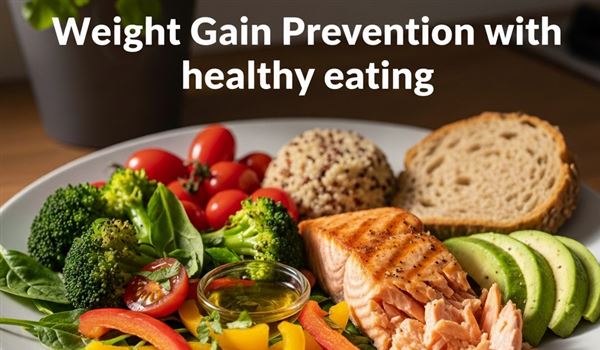Weight Gain Prevention Healthy Eating

Patient Information Leaflet: Healthy Eating to Prevent or Manage Weight Gain
Kensington Medical Centre – Belfast
⸻
What Is Obesity?
Obesity means having too much body fat, which can raise the risk of conditions like heart disease, diabetes, joint problems, and some cancers. It is often caused by eating more calories than the body uses over time. The good news is that healthy changes in eating and activity can make a big difference.
⸻
Why a Healthy Diet Matters
• Supports gradual, long-term weight loss
• Improves energy, mood, and sleep
• Lowers risk of long-term health conditions
• Helps maintain weight loss over time
⸻
Best Foods for Weight Loss and Good Health
1. Vegetables and Fruits
High in fibre and water, low in calories, and full of nutrients.
Examples: leafy greens, carrots, tomatoes, apples, berries, oranges (aim for 5 portions daily)
2. Wholegrains
Keep you feeling full and stabilise blood sugar.
Examples: oats, brown rice, quinoa, wholemeal bread and pasta
3. Lean Protein
Helps maintain muscle and keeps you feeling satisfied.
Examples: chicken, turkey, eggs, fish, tofu, beans, lentils, low-fat dairy
4. Healthy Fats (in small amounts)
Support heart health and help you feel full.
Examples: olive oil, avocado, nuts, seeds, oily fish (Salmon, Mackerel Anchovies, Sardines, Herring)
5. Water and Low-Calorie Drinks
Helps control hunger and supports metabolism.
Aim for 6–8 glasses of fluid daily (limit sugary drinks)
⸻
Foods to Limit
• Sugary drinks and snacks – high in empty calories
• Fried and processed foods – high in fat and salt
• White bread, pastries, and sugary cereals – low in fibre
• Fast food and takeaways – often high in calories and saturated fats
• Alcohol – can add extra calories and affect decision-making
⸻
Healthy Eating Tips
• Eat regular meals and avoid skipping breakfast
• Use smaller plates and be mindful of portion sizes
• Fill half your plate with vegetables at lunch and dinner
• Choose snacks like fruit, plain yoghurt, or a handful of nuts
• Plan meals and cook at home when possible
• Keep a food diary to stay aware of what and how much you’re eating
⸻
Physical Activity Supports Weight Loss
• Aim for at least 150 minutes of moderate exercise a week
• Try walking, cycling, swimming, or dancing
• Break up sitting time with short walks or stretches
• Include strength-building activities twice a week (e.g. resistance bands or body-weight exercises)
⸻
When to See a Doctor
Speak to your GP if you:
• Want to lose weight and need support or a referral
• Have health problems linked to weight (e.g. high blood pressure or diabetes)
• Need help choosing a safe and effective weight loss plan
• Are interested in a local weight management programme
⸻
For more information, visit www.nhs.uk/better-health/lose-weight
This leaflet is for general information only. Please speak to your healthcare provider for advice specific to you.
Medical Disclaimer
The dietary advice and information provided in this leaflet are for general guidance and educational purposes only. They are not intended to replace personalised advice, diagnosis, or treatment from a qualified healthcare professional.
If you have a medical condition, are taking medication, are pregnant or breastfeeding, or have specific dietary needs or food allergies, you should consult your GP, dietitian, or another healthcare provider before making significant changes to your diet.
Following general dietary recommendations without proper medical supervision may not be suitable for everyone and could result in unintended health effects. Always seek individualised medical advice for your personal health circumstances.
Page created: 07 June 2025